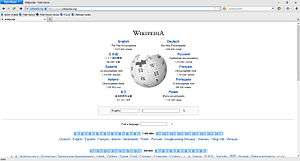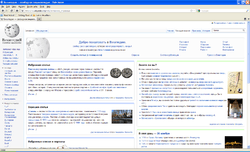Pale Moon (web browser)
 Pale Moon 26 running on Windows 10 | |
| Developer(s) | M.C. Straver[1] |
|---|---|
| Initial release | October 4, 2009 |
| Stable release | 28.1.0 (20 September 2018[2]) [±] |
| Repository |
|
| Development status | Active |
| Written in | C/C++, CSS, JavaScript, XUL |
| Operating system | Windows 7 or later, Linux (unofficial build for macOS[3] and contributed builds for various platforms[4]) |
| Engines | Goanna, SpiderMonkey |
| Platform | IA-32, x86-64[5] |
| Available in | 18 languages[6] |
| Type |
Web browser News aggregator |
| License |
|
| Website |
www |
Pale Moon is an open-source web browser with an emphasis on customizability; its motto is "Your browser, Your way".[8] There are official releases for Microsoft Windows and Linux,[8] an unofficial build for macOS,[3] and contributed builds for various platforms.[4]
Pale Moon is a fork of Firefox with substantial divergence. The main differences are the user interface, add-on support, and running in single-process mode. Pale Moon retains the highly customizable user interface of the Firefox version 4–28 era.[9] It also continues to support some types of add-ons that are no longer supported by Firefox.[9][10][11]
Overview


Pale Moon has diverged from Firefox in a number of ways:
- Always runs in single-process mode, whereas Firefox became a multi-process program.[12][13]
- Replaces the Gecko browser engine with the Goanna fork
- Uses the pre-Australis Firefox user interface
- Continues add-on support for XUL, XPCOM, and NPAPI plugins, all of which are no longer supported in Firefox.[9]
- Supports add-ons exclusive to Pale Moon, including dozens of themes.[14]
- Defaults to a customizable start page in cooperation with start.me[15]
- Defaults to DuckDuckGo as the search engine instead of Google or Yahoo!
- Uses the IP-API service instead of Google's for geolocation[16]
Old platforms
Version 26.5 was the final official release to support Windows XP.[17] There are some unofficial projects to build newer versions for XP.[18] Version 27.9 was the final official release to support Windows Vista.
The official releases do not support older processors without the SSE2 instruction set.[5] However, a contributed build for Linux is available that supports some older processors.[19]
License
Pale Moon's source code is released under the Mozilla Public License 2.0 except for parts relating to branding. To ensure quality, redistribution of officially branded Pale Moon binaries is only permissible under specific circumstances.[7] The name and logo are trademarked by the project founder and cannot be used without his prior permission.[20]
History
M.C. Straver is the project founder and lead developer.[1] Straver's first official release of Pale Moon, in 2009, was a rebuild of Firefox 3.5.2 with tweaked compiler settings.[21] Eventually the scope of the project grew, and version 24 became a true fork of Firefox 24 ESR.[21] Starting with version 25, Pale Moon uses a completely independent versioning scheme.[22]
Pale Moon 27 was a major re-fork of the core browser code to Firefox 38 ESR, which added HTTP/2, DirectX 11, MSE/DASH, and JavaScript ES6 capabilities.[23] Add-on support remained almost entirely unchanged, with a slight reduction of Jetpack compatibility.[9][24]
UXP
In 2017, Straver began the Unified XUL Platform (UXP) project.[25] UXP is a fork of Firefox 52 ESR[26] with significant modifications to be a platform for creating any number of XUL-based applications.[27][28] To demonstrate and refine UXP, Straver used it to create a new browser, Basilisk.[29][30]
Pale Moon 28, released in August 2018, was the first version built on UXP, thereby providing improved support for web standards and video.[31] This is also the first version that will have official macOS releases.[32]
Other
Pale Moon for Android was a distinct development effort that is no longer maintained.[33] First released in 2014,[34] Straver announced the following year that it would likely be abandoned due to lack of community involvement.[35] The final release was 25.9.6.[36]
FossaMail is an email client created by Straver. It is a fork of Mozilla Thunderbird using the layout engine of Pale Moon.[37] Straver ended official support of it in 2017,[38] though he still maintains it for his own personal use and shares these updates via FTP.[39]
Benchmarks
Straver has downplayed the role of benchmark tests, stating that they "can't be used to draw hard (or regularly even any) conclusions. Plain and simple: they are an indication, nothing more. They serve well if you compare closely related siblings (e.g. Firefox and Iceweasel) or different builds of the exact same browser, to get a relative performance difference between the two on the limited subset of what is actually tested, but that's about as far as it goes."[40]
In 2013, Pale Moon was a bit slower than Firefox in the ClubCompy Real-World Benchmark, with the browsers respectively scoring 8,168 and 9,344 points out of a possible 50,000.[41] In a 2016 browser comparison test by Ghacks, Pale Moon had the smallest memory footprint after opening 10 different websites in separate tabs.[42] However, in the same report Pale Moon scored the worst in the Mozilla Kraken, Google Octane, 32-bit RoboHornet and second-to-worst 64-bit RoboHornet benchmarks and hung during the JetStream JavaScript benchmark.[42]
Market share
References
- 1 2 M.C. Straver. "About Moonchild Productions". Archived from the original on 2017-03-13. Retrieved 2018-04-19.
- ↑ "Pale Moon – Release Notes". Pale Moon.
- 1 2 "Pale Moon for Mac OSX". Retrieved 2018-03-19.
- 1 2 "Contributed builds of Pale Moon". Pale Moon. Retrieved 2017-02-12.
- 1 2 "Pale Moon - Technical Details".
- ↑ "Pale Moon language packs". Moonchild Productions. Retrieved 2017-02-09.
- 1 2 "Pale Moon redistribution", Official website, retrieved 2017-02-10
- 1 2 "The Pale Moon Project homepage". Pale Moon. Retrieved 2017-01-09.
- 1 2 3 4 "Pale Moon future roadmap". Pale Moon. Retrieved 2017-02-09.
- ↑ Kev Needham (2015-08-21). "The Future of Developing Firefox Add-ons". blog.mozilla.org. Retrieved 2015-09-07.
- ↑ Jorge Villalobos (2017-02-16). "The Road to Firefox 57 – Compatibility Milestones". blog.mozilla.org. Retrieved 2017-02-17.
- ↑ "Multiprocess Firefox". Mozilla. Retrieved 24 August 2018.
- ↑ "Multi-process, or: the drawbacks nobody ever talks about". Pale Moon forum. M.C. Straver. Retrieved 24 August 2018.
- ↑ https://addons.palemoon.org/themes/
- ↑ "Browser Pale Moon Integrates New Personal Start Page" (Press release). Amsterdam: PRWeb. February 11, 2015.
- ↑ "Pale Moon 24.3.0 released! - Pale Moon forum". forum.palemoon.org. Retrieved 2017-04-09.
- ↑ "End of Windows XP support in Pale Moon". Archived from the original on 2017-08-23.
- ↑ "Building Palemoon 27 for XP".
- ↑ "Pale Moon SSE for Linux".
- ↑ "Pale Moon branding information". Official website.
- 1 2 "History of the Pale Moon project". Moonchild Productions. Retrieved 2017-02-06.
- ↑ "What is Pale Moon's versioning scheme like?".
- ↑ "The Future of Pale Moon". palemoon.org.
- ↑ "Jetpack Style Extensions". Retrieved 2017-02-10.
- ↑ "README for the initial, deprecated UXP repository on GitHub". Retrieved 2018-04-25.
- ↑ "README for the current UXP repository on GitHub". Retrieved 2018-04-25.
- ↑ "UXP vs goanna".
- ↑ "There is only XUL". Retrieved 18 September 2018.
- ↑ "Pale Moon team releases first version of Basilisk browser". ghacks.net. 2017-11-17. Retrieved 2017-11-20.
- ↑ M.C. Straver (2018-04-20). "Basilisk's nature (a small clarification)".
- ↑ Pale Moon 28.0.0 release notes
- ↑ "New milestone planned for mid-August - Pale Moon forum". forum.palemoon.org. Retrieved 2018-07-21.
- ↑ "Pale Moon for Android". Retrieved 2017-02-09.
- ↑ "Pale Moon for Android 24.7.1". August 3, 2014.
- ↑ "I may have to let Pale Moon for Android go. :(". April 16, 2015.
- ↑ "Pale Moon for Android updated to 25.9.6!". Retrieved 2017-02-09.
- ↑ https://www.ghacks.net/2014/07/10/fossamail-optimized-version-thunderbird-windows-pale-moons-author/
- ↑ https://forum.palemoon.org/viewtopic.php?f=36&t=15430
- ↑ https://forum.palemoon.org/viewtopic.php?f=58&t=15761
- ↑ "What's the deal with browser benchmarks? - Pale Moon forum". forum.palemoon.org. Retrieved 2017-06-22.
- ↑ Matt Nawrocki. "Review: Pale Moon web browser for Windows". TechRepublic. Retrieved 2017-02-12.
- 1 2 Martin Brinkmann. "32-bit vs 64-bit browsers: which version has the edge?". GHacks. Retrieved 2017-02-12.
- ↑ "Desktop Browser Market Share Worldwide". StatCounter.